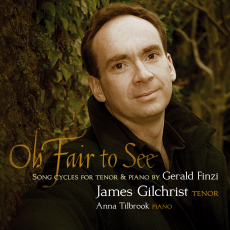Finzi - James Gilchrist - MusicWeb-International.com
Gerald Finzi passed away almost fifty years ago. At last, perhaps, his music will receive its due with recordings as exemplary as this. Here is, in many ways, a tenor companion piece to the recent recording of Finzi's baritone songs by Roderick Williams.
Gilchrist and Williams frequently work together and both have developed a direct, modern approach to English song which articulates it with vividness and immediacy. But there is a dramatic difference between the two recordings. This one, recorded by Linn Records, manufacturers of the legendary Linn Sondek turntables, is state of the art in terms of sound quality. Usually sound quality doesn't bother me at all, but when it is as clear and perfect as this, it is breath-taking. It sounds as if the performers are there in the room by you: the intimacy of sound is amazingly pure and natural. Linn is a specialist, independent label which uses art audiophile techniques. They do not compromise whatsoever on quality, and it pays off. This is what recording should be: after listening to this, it's painful to listen to recordings where quality has been sacrificed for cost. I've started to investigate the rest of the Linn catalogue and enjoy music I might not otherwise explore. Their motto is right: these recordings are "sublime".
Gilchrist's voice is in superb form here, his pure, clean tone even throughout his range. The recording starts with a selection of songs gathered together posthumously as a group, taking their title from the lovely O fair to see. As a group it covers Finzi's whole career, from the early (1921) As I lay in the early sun to To Joy, completed brief weeks before his death. O fair to see, to a poem by Christina Rossetti is Finzi's take on the very similar Housman poem When I was one and twenty. One wonders how Finzi might have set Housman had he not been more attuned to Hardy. Nonetheless, Finzi's choice of poets reflected his own introspective sensitivity. He was a champion of Ivor Gurney, both as composer and poet. The piano interlude in Only the Wanderer captures the subtle, understated nature of Gurney's tragedy, framing the cry from the heart "Do not forget me, O Severn meadows". Finzi was a friend of Edmund Blunden, too. Blunden's poem is ostensibly about a still-born baby, but, given Finzi's fondness for cryptic tributes to his wife, Joy, could there not be some hidden reference to Finzi himself as dependent on her warmth? Certainly Since we loved has been described by Stephen Banfield as Finzi's "beautiful and perfect final love letter to Joy, to his art and to life itself", even though Finzi, though ridden with cancer, did not know he was about to die. Gilchrist sings both with a tenderness that evokes the depth of love that lifts these songs to a level of elegance that belies their simplicity. Knowing what we know about the Finzi's marriage and his imminent passing, the lines about " a babe beloved - thrust out alone upon death's wilderness" take on extra poignancy.
The same emotional depth infuses In years defaced, whose lines "Till Earth outwears shall love like theirs suffuse this glen". Finzi's songs for tenor are often less dramatic than his songs for baritone, placing more on the performer's ability to draw meaning and colour from their simplicity. For example, The Market girl as a poem is excruciatingly maudlin. Finzi's setting is so pure that one overlooks the banality: Gilchrist sings it without sentimentality, respecting the dignity of feeling behind the unfortunate text.
A young man's exhortation (1926-9) is musically far superior. Finzi contrasts songs of youth with songs of reflection, writing more variation into individual songs. Indeed, Gilchrist positively delights in the exuberant outburst of glee that marks "exalt and crown the hour" in the first song, so different from the self-effacing reticence of much of Finzi's style. Ditty, unsurprisingly is not a "ditty" so much as an exquisite meditation on love. Tilbrook's playing is delicate, a lovely counterfoil to the sensuous "there she dwells!" Gilchrist excels in this song, singing with suppressed passion. Finzi then provides a true Hardyesque moment. The Budmouth Dears and the soldiers who court them come alive in "with a smart Clink! Clink! Up the esplanade and down!" This is a vivid picture straight out of a Wessex tale. Gilchrist cuts a dash, too. Even more dramatic is Shortening Days, where Finzi varies his tempi and phrasing. It gives Gilchrist a chance to sing an expansive crescendo at the end. The Sigh could almost be as embarrassing as The Market girl, but the piano part is more sophisticated, and Gilchrist again sings without coyness. The Budmouth dears return again, now elderly, in Former Beauties. A snatch of the "gay tunes" of the past echoes in the piano part: the gentle timbre of the voice bespeaks sympathy. Finzi returns to minor key in The Dance continued, but warms it with lines that open upwards and evaporate in lilting dance-like figures. Death seems almost a pleasure "slumbering peacefully".
Of the various Finzi recordings this year, this is the one to get, and to enjoy for years to come. It is head and shoulders above any other versions I've heard. Before and After Summer and the baritone songs may be technically more sophisticated, but Gilchrist is definitely my top recommendation for the sheer beauty of performance. The simpler the song, the more essential is a good, thoughtful understanding of its inner qualities. Gilchrist sings with an intelligence that adds great poise, making some of them sound like master-works. This is what good performance - and exceptionally good recording - is all about. Will Linn record more of Gilchrist and Finzi, perhaps Dies Natalis itself ? I hope so, and look forward to almost anything Linn will promote.

